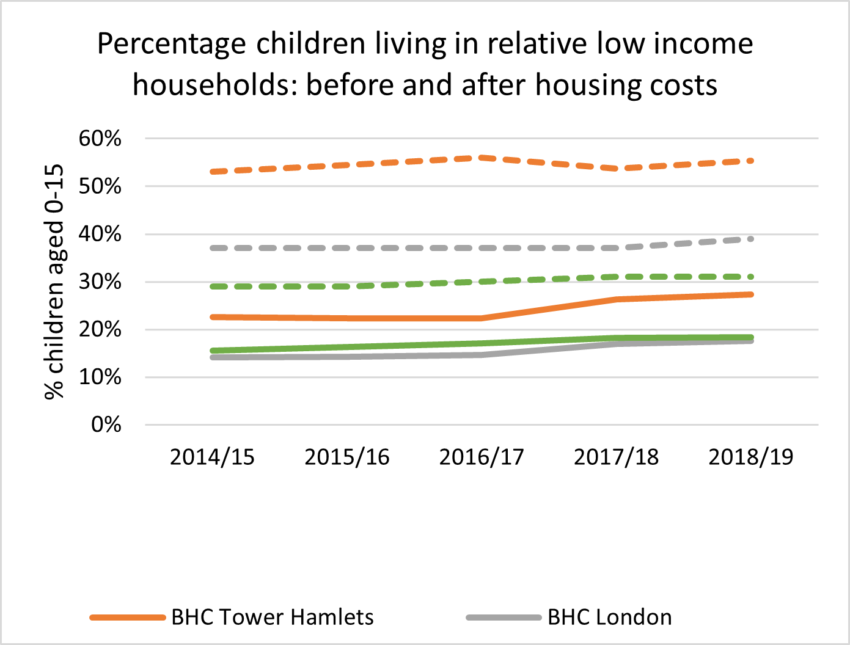The borough of Tower Hamlets covers a large part of the east end of London. The borough lies on the north bank of the River Thames, immediately to the east of the City of London. Canary Wharf and the Isle of Dogs are at the heart of the borough, an area thriving with large corporate businesses.
Tower Hamlets is known for its areas of deep deprivation, that contrast with its areas of wealth. Currently, the borough has 20,000 people on their housing waiting list, as well as high levels of crime [1].
In the borough, there are around 325,000 residents, and around 300,000 jobs, but most jobs (86%) are filled by non-residents. The median earnings of workers in the area are the 2nd highest in the UK. However, residents earn significantly less than this.

The population has grown significantly since 2009, with the area seeing an influx of young workers. It is a relatively young borough which makes it a very vibrant place to live.
Tower Hamlets has become significantly less deprived in recent years. Between 2015 and 2019 it moved from 10th to 50th on the Indices of Multiple Deprivation. However, 60% of the borough is still within the 30% of the most deprived parts of the UK.
Deprivation among children and older people is much higher than deprivation as a whole. As with other parts of the country, in-work poverty appears to be an increasing issue with a high proportion of means-tested financial support now going to people in work.
The Covid-19 pandemic has had a significant impact on the job market in Tower Hamlets, which may have a long term impact on the extent and nature of poverty and deprivation within the borough.
Victims of Poverty
Child poverty is a significant problem in Tower Hamlets. Even before the pandemic, in in-work poverty, housing costs and social security reforms were biting households.

The child poverty rates for Tower Hamlets can be seen in the graph above. On average, Tower Hamlets has significantly more children living in poverty than the rest of London and England, with over half the children in the borough living in poverty.
Additionally, the older residents of Tower Hamlets are also impacted by poverty. 44% of older people in the borough live in income deprived households, the highest proportion in England and more than double the national average.
Framework for Local Area Action
Tower Hamlets Council have introduced several measures to help residents living in poverty. They have a set of guiding principles which inform their work:
- Early intervention
- Resident Engagement and Feedback
- Partnerships and ‘no wrong door’
- Equity, access, and cultural competence
- Data, evaluation, and employment
These principles are used when working towards preventing poverty, increasing incomes, reducing costs, and providing emergency support.
Preventing Poverty: The council work to increase employment opportunities. They have a work-path scheme which helps support younger people into work. Tower Hamlets has a huge amount of employment opportunity in Canary Wharf and the council want to see more local young people involved in those businesses.
When new planning applications come into the council, they ensure that there are commitments from the developers to employ local people.
For older residents, the council are running an annual, data-informed campaign to make sure residents are claiming their pension.
Increasing Incomes: The council work to ensure that residents living in poverty are claiming all the benefits that they are entitled to. They fund an advice network in Tower Hamlets. There are 22 organisations that provide benefits advice in the area.
Reducing Costs: Residents who are on the lowest income in the borough are eligible for the 100% Council Tax Reduction Scheme, which means they don’t have to pay Council Tax at all. This scheme costs the council £34 million.
All primary school children in Tower Hamlets are eligible for free school meals, in a move to tackle child poverty in the borough. This scheme costs the council £2 million. These investments are becoming harder to fund due to reduced funding from the Government.
Fuel poverty and food poverty were a focus of the council during the pandemic. They ramped up their support for food banks. Pre-pandemic, the council were supporting 5 food banks in the area, they are now supporting 40.
Emergency Support: The Residents Support Scheme gives out crisis grants to residents living in precarious situations. The council also works to prevent evictions, supporting those who are living on the edge of homelessness with housing.
Wellbeing and life chances: The council invest heavily in their culture, leisure, youth services and green spaces to give residents a pleasant place to live. School attainment level in the borough is excellent which will help a generational shift out of poverty.
Poverty Review

The London Borough of Tower Hamlets: Poverty Review 2021 [2], detailed a review of the council’s interventions. A lot of time was taken to understand the lived experiences of residents living on low incomes and these experiences were detailed in the review.
The 2021 Poverty Review highlighted what needs to be done to improve the lives of the residents of Tower Hamlets.
The council have identified that making the most of what their partners in the borough have to offer is highly valuable and that partners should work with the council to promote what support is available to residents.
The review flagged that residents are not always aware of the support available to them. This information should be accessible and communicated well.
The council are looking to see what additional support can be put into place as pandemic protections are withdrawn and economic recovery begins. The cost of living in the UK is at a high which puts additional strain on those already struggling financially.
New data from January 2022 showed UK prices rose at their highest rate for 30 years in December, fuelling the country’s cost-of-living crisis and putting more pressure on the Bank of England to raise interest rates [3].
Findings
Short term impact – Early financial intervention: A whole systems approach to increasing incomes, reducing costs and arrears, and averting financial crisis. Strategies to stop people from getting to the point of financial crisis are consistently being discussed by the council.
Medium-term impact – Employment and skills: The development of a partnership programme to improve skills and access to decent work, with opportunities for progression.
Long term impact – A bright future for the next generation: A relentless focus on achieving the best possible outcomes for all children. This could see a generational shift, where the children of Tower Hamlets grow up with brighter prospects in their home borough.
A better understanding of the journey and pathways of residents is crucial when developing schemes and strategies to tackle poverty and deprivation.
The council also know that rethinking their services, how they are organised and delivered could provide a wealth of income, generating prospects for residents. Overall, a key driver in supplementing the income of residents and reducing poverty in Tower Hamlets is to provide clearly communicated and accessible gateways to information, guidance, and support.
[1]Bustin, Mufeedah. 2022. Cabinet Member for Social Inclusion, Tower Hamlets Council
[2] London Borough of Tower Hamlets: Poverty Review 2021
[3] The Financial Times. 2022. UK cost of living crisis intensifies
Register FREE to access 2 more articles
We hope you’ve enjoyed your first article on GE Insights. To access 2 more articles for free, register now to join the Government Events community.
(Use discount code CPWR50)




